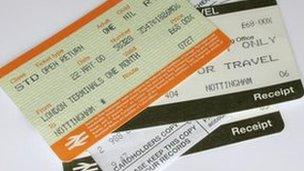Hundreds of rail ticket offices face axe, union warns
- Published

The TSSA said the list included 265 offices in London and the South East
One in four railway ticket offices in England and Wales could close under recommendations in a government-commissioned report, a transport union has warned.
The Transport Salaried Staffs Association said a "hit list" of 675 stations could be left unstaffed.
The report, drawn up by Sir Roy McNulty, recommends the replacement of ticket offices with machines.
A Department for Transport spokesman said it was considering the report.
"Any of his proposed changes to rail fares or ticketing will be examined as part of a government review," he added.
TSSA officials said they only discovered the recommendation to scrap hundreds of ticket offices when they read the full report on how to achieve savings in the railway industry, which runs to hundreds of pages.
They claim it was not published in the executive summary.
The union warned the closures could result in the loss of 1,000 jobs, and said the list of stations that would be left unstaffed included 265 offices in London and the South East, and 114 in the North West.
Publishing the list, TSSA leader Gerry Doherty called on Transport Secretary Philip Hammond to reject the cutbacks.
Mr Doherty said: "This is a double whammy for millions of passengers. Last month they were told that fares will rise by 25% over the next three years, and they are now set to lose one in four ticket offices.
"Not only are unmanned stations less secure, tickets bought from machines are usually more expensive. Philip Hammond should come to the dispatch box in the next few days and give a clear undertaking that he is going to ditch these draconian cuts in services to passengers."
'Political suicide mission'
The union is launching an "SOS-Save our Station ticket offices" campaign, which will tour the political party conferences over the next four weeks and urge MPs to save local ticket offices in their constituencies.
Mr Doherty also accused the Transport Secretary of being on a "political suicide mission" because 40% of the stations on the list are in the Tory heartlands of the South East.
"He seems determined to test commuter support for the Tories to destruction by, firstly, massively hiking fares, which are already the most expensive in Europe, and on top of that shutting nearly 700 ticket offices."
The TSSA said those on the list were all listed as "category E" stations, serving fewer than 250,000 passengers a year and where ticket offices open for less than 10 hours a day, usually in the morning and evening peak hours.
Officials said at least one or two ticket office staff would be employed at the stations, warning that more than 1,000 jobs could be axed if the closures go ahead.
Bob Crow, general secretary of the Rail Maritime and Transport union, said the "shocking scale of the ticket office massacre" was a "wake-up call to the public" as the government prepared to reveal its formal response to the McNulty rail review.
"These cuts would de-staff stations and turn the rail network into a criminals' paradise, and that's why we are uniting workers and passengers in a massive campaign of resistance," he said.
A spokesman for the Association of Train Operating Companies said it recognised the importance of having staff at stations, and "understands that passengers want to talk to another human being, in particular when there is disruption".
He said: "Currently, any changes to ticket office opening times have to undergo a rigorous consultation process and ensure that passengers' needs continue to be met. The government is yet to announce how it intends to take forward McNulty's recommendations.
"The industry needs to cut costs as a way of limiting future fare rises and providing better value for money for the taxpayer.
"Recent years have seen a fundamental shift in the way that people buy train tickets. There have been big increases in the use of ticket machines, rail websites and smartcards, meaning that around one in three tickets is now bought from station ticket offices."
The government is expected to respond fully next month to the report, which maintained that the railway industry could make savings of £1bn a year.
- Published13 April 2011
- Published26 January 2011
- Published21 July 2011
- Published2 January 2011